Study Skills: Essay and Report on Culture, CSR, and Business
VerifiedAdded on 2020/10/23
|11
|3759
|394
Report
AI Summary
This report provides a comprehensive analysis of Hofstede's cultural dimensions and their impact on business, along with a literature review on Corporate Social Responsibility (CSR). The report begins with a critical evaluation of Hofstede's model, discussing its dimensions (individualism/collectivism, power distance, uncertainty avoidance, and masculinity/femininity) and their application in different cultural contexts. It then justifies agreements and disagreements with the suggestions made in the article, considering the adaptability of businesses in international markets and the influence of changing communication methods. The report also critiques the model's limitations, such as its reliance on a small sample size and the lack of consideration for globalization. The second part of the report focuses on CSR, defining it as a self-regulating business model and reviewing literature on its importance for companies and society. It highlights the benefits of CSR, including enhanced brand image, stronger employee relations, and increased public trust. The report also touches upon the long-term aims of CSR and the steps businesses can take to improve society through ethical operations and environmental initiatives.

STUDY SKILLS
Paraphrase This Document
Need a fresh take? Get an instant paraphrase of this document with our AI Paraphraser
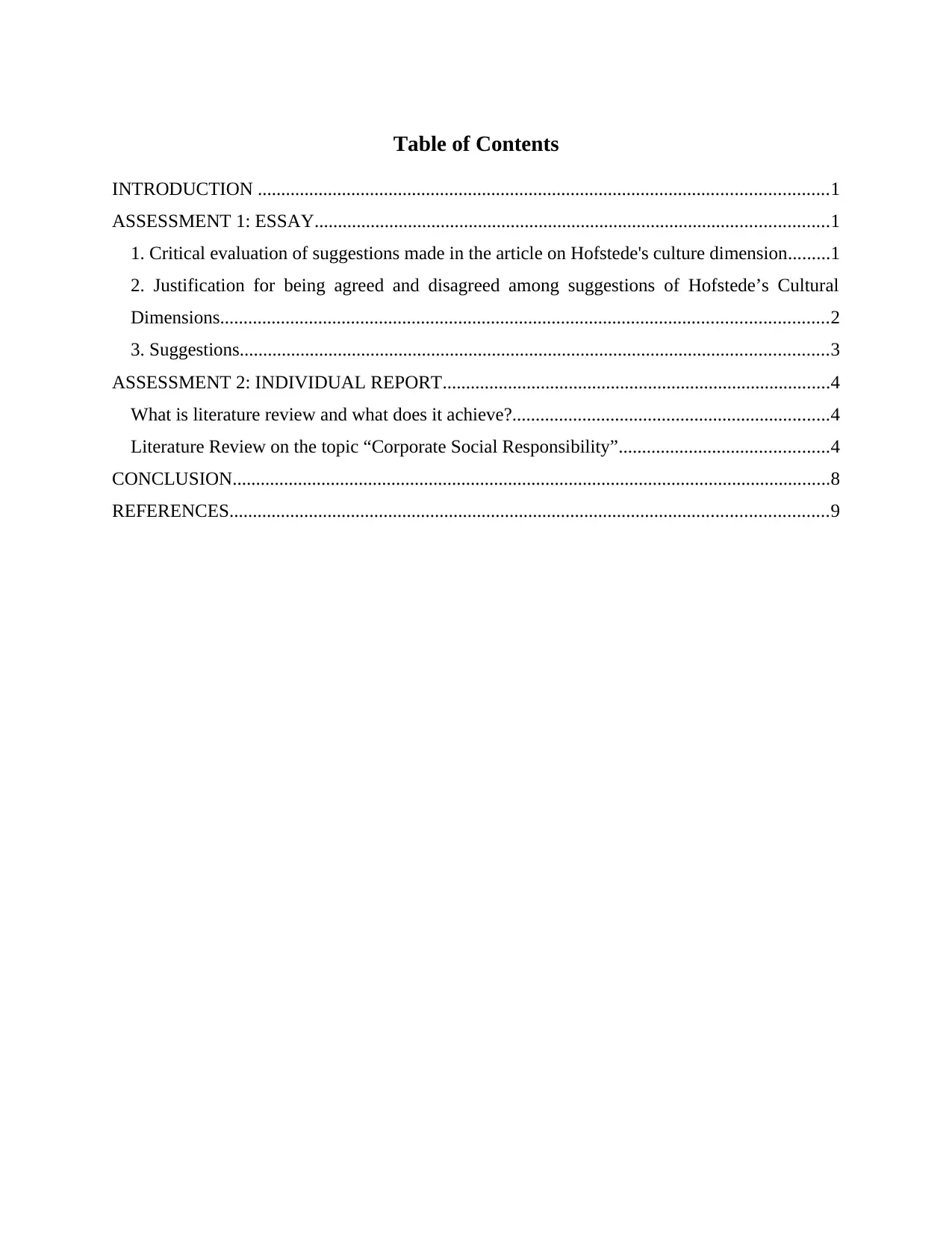
Table of Contents
INTRODUCTION ..........................................................................................................................1
ASSESSMENT 1: ESSAY..............................................................................................................1
1. Critical evaluation of suggestions made in the article on Hofstede's culture dimension.........1
2. Justification for being agreed and disagreed among suggestions of Hofstede’s Cultural
Dimensions..................................................................................................................................2
3. Suggestions..............................................................................................................................3
ASSESSMENT 2: INDIVIDUAL REPORT...................................................................................4
What is literature review and what does it achieve?....................................................................4
Literature Review on the topic “Corporate Social Responsibility”.............................................4
CONCLUSION................................................................................................................................8
REFERENCES................................................................................................................................9
INTRODUCTION ..........................................................................................................................1
ASSESSMENT 1: ESSAY..............................................................................................................1
1. Critical evaluation of suggestions made in the article on Hofstede's culture dimension.........1
2. Justification for being agreed and disagreed among suggestions of Hofstede’s Cultural
Dimensions..................................................................................................................................2
3. Suggestions..............................................................................................................................3
ASSESSMENT 2: INDIVIDUAL REPORT...................................................................................4
What is literature review and what does it achieve?....................................................................4
Literature Review on the topic “Corporate Social Responsibility”.............................................4
CONCLUSION................................................................................................................................8
REFERENCES................................................................................................................................9
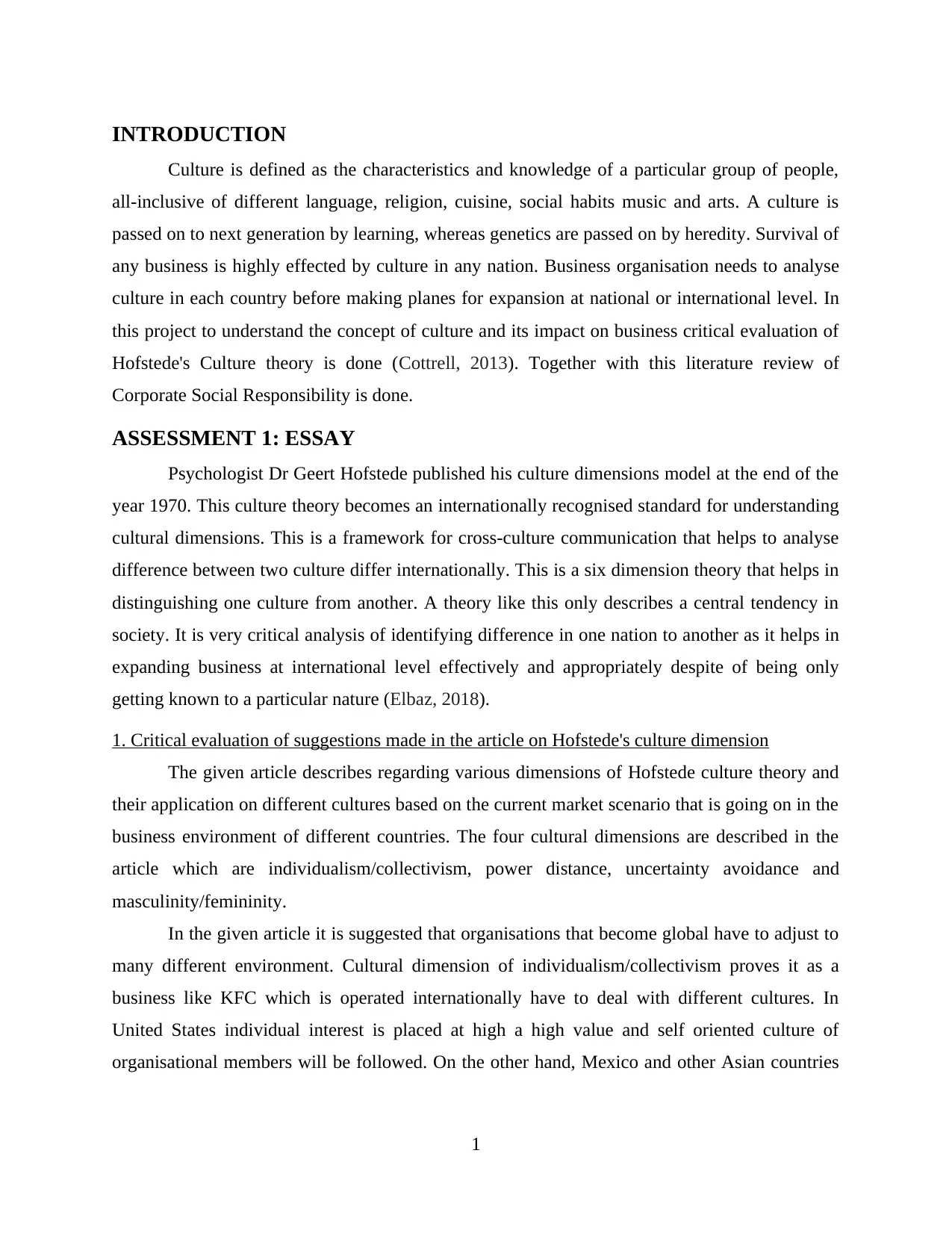
INTRODUCTION
Culture is defined as the characteristics and knowledge of a particular group of people,
all-inclusive of different language, religion, cuisine, social habits music and arts. A culture is
passed on to next generation by learning, whereas genetics are passed on by heredity. Survival of
any business is highly effected by culture in any nation. Business organisation needs to analyse
culture in each country before making planes for expansion at national or international level. In
this project to understand the concept of culture and its impact on business critical evaluation of
Hofstede's Culture theory is done (Cottrell, 2013). Together with this literature review of
Corporate Social Responsibility is done.
ASSESSMENT 1: ESSAY
Psychologist Dr Geert Hofstede published his culture dimensions model at the end of the
year 1970. This culture theory becomes an internationally recognised standard for understanding
cultural dimensions. This is a framework for cross-culture communication that helps to analyse
difference between two culture differ internationally. This is a six dimension theory that helps in
distinguishing one culture from another. A theory like this only describes a central tendency in
society. It is very critical analysis of identifying difference in one nation to another as it helps in
expanding business at international level effectively and appropriately despite of being only
getting known to a particular nature (Elbaz, 2018).
1. Critical evaluation of suggestions made in the article on Hofstede's culture dimension
The given article describes regarding various dimensions of Hofstede culture theory and
their application on different cultures based on the current market scenario that is going on in the
business environment of different countries. The four cultural dimensions are described in the
article which are individualism/collectivism, power distance, uncertainty avoidance and
masculinity/femininity.
In the given article it is suggested that organisations that become global have to adjust to
many different environment. Cultural dimension of individualism/collectivism proves it as a
business like KFC which is operated internationally have to deal with different cultures. In
United States individual interest is placed at high a high value and self oriented culture of
organisational members will be followed. On the other hand, Mexico and other Asian countries
1
Culture is defined as the characteristics and knowledge of a particular group of people,
all-inclusive of different language, religion, cuisine, social habits music and arts. A culture is
passed on to next generation by learning, whereas genetics are passed on by heredity. Survival of
any business is highly effected by culture in any nation. Business organisation needs to analyse
culture in each country before making planes for expansion at national or international level. In
this project to understand the concept of culture and its impact on business critical evaluation of
Hofstede's Culture theory is done (Cottrell, 2013). Together with this literature review of
Corporate Social Responsibility is done.
ASSESSMENT 1: ESSAY
Psychologist Dr Geert Hofstede published his culture dimensions model at the end of the
year 1970. This culture theory becomes an internationally recognised standard for understanding
cultural dimensions. This is a framework for cross-culture communication that helps to analyse
difference between two culture differ internationally. This is a six dimension theory that helps in
distinguishing one culture from another. A theory like this only describes a central tendency in
society. It is very critical analysis of identifying difference in one nation to another as it helps in
expanding business at international level effectively and appropriately despite of being only
getting known to a particular nature (Elbaz, 2018).
1. Critical evaluation of suggestions made in the article on Hofstede's culture dimension
The given article describes regarding various dimensions of Hofstede culture theory and
their application on different cultures based on the current market scenario that is going on in the
business environment of different countries. The four cultural dimensions are described in the
article which are individualism/collectivism, power distance, uncertainty avoidance and
masculinity/femininity.
In the given article it is suggested that organisations that become global have to adjust to
many different environment. Cultural dimension of individualism/collectivism proves it as a
business like KFC which is operated internationally have to deal with different cultures. In
United States individual interest is placed at high a high value and self oriented culture of
organisational members will be followed. On the other hand, Mexico and other Asian countries
1
⊘ This is a preview!⊘
Do you want full access?
Subscribe today to unlock all pages.

Trusted by 1+ million students worldwide
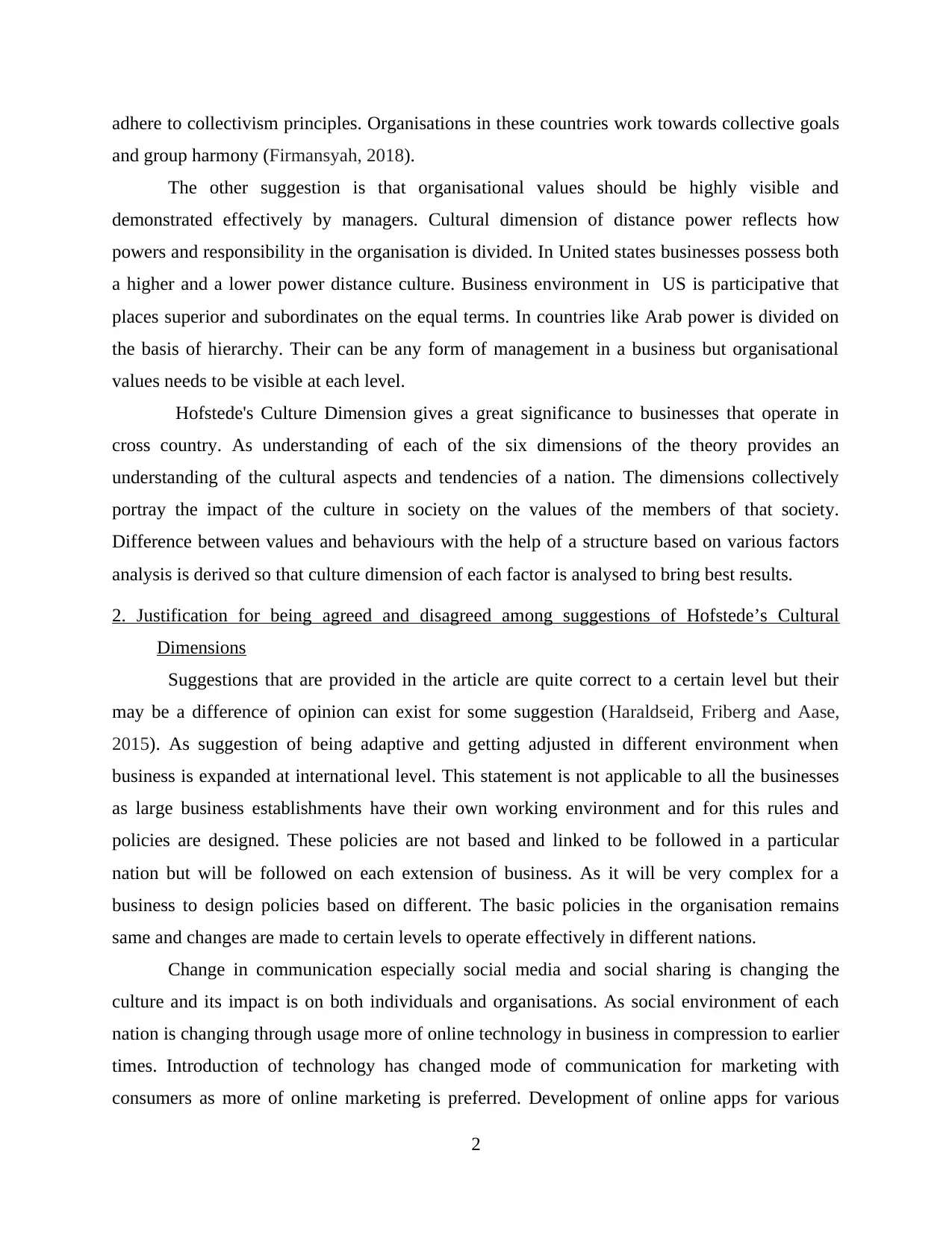
adhere to collectivism principles. Organisations in these countries work towards collective goals
and group harmony (Firmansyah, 2018).
The other suggestion is that organisational values should be highly visible and
demonstrated effectively by managers. Cultural dimension of distance power reflects how
powers and responsibility in the organisation is divided. In United states businesses possess both
a higher and a lower power distance culture. Business environment in US is participative that
places superior and subordinates on the equal terms. In countries like Arab power is divided on
the basis of hierarchy. Their can be any form of management in a business but organisational
values needs to be visible at each level.
Hofstede's Culture Dimension gives a great significance to businesses that operate in
cross country. As understanding of each of the six dimensions of the theory provides an
understanding of the cultural aspects and tendencies of a nation. The dimensions collectively
portray the impact of the culture in society on the values of the members of that society.
Difference between values and behaviours with the help of a structure based on various factors
analysis is derived so that culture dimension of each factor is analysed to bring best results.
2. Justification for being agreed and disagreed among suggestions of Hofstede’s Cultural
Dimensions
Suggestions that are provided in the article are quite correct to a certain level but their
may be a difference of opinion can exist for some suggestion (Haraldseid, Friberg and Aase,
2015). As suggestion of being adaptive and getting adjusted in different environment when
business is expanded at international level. This statement is not applicable to all the businesses
as large business establishments have their own working environment and for this rules and
policies are designed. These policies are not based and linked to be followed in a particular
nation but will be followed on each extension of business. As it will be very complex for a
business to design policies based on different. The basic policies in the organisation remains
same and changes are made to certain levels to operate effectively in different nations.
Change in communication especially social media and social sharing is changing the
culture and its impact is on both individuals and organisations. As social environment of each
nation is changing through usage more of online technology in business in compression to earlier
times. Introduction of technology has changed mode of communication for marketing with
consumers as more of online marketing is preferred. Development of online apps for various
2
and group harmony (Firmansyah, 2018).
The other suggestion is that organisational values should be highly visible and
demonstrated effectively by managers. Cultural dimension of distance power reflects how
powers and responsibility in the organisation is divided. In United states businesses possess both
a higher and a lower power distance culture. Business environment in US is participative that
places superior and subordinates on the equal terms. In countries like Arab power is divided on
the basis of hierarchy. Their can be any form of management in a business but organisational
values needs to be visible at each level.
Hofstede's Culture Dimension gives a great significance to businesses that operate in
cross country. As understanding of each of the six dimensions of the theory provides an
understanding of the cultural aspects and tendencies of a nation. The dimensions collectively
portray the impact of the culture in society on the values of the members of that society.
Difference between values and behaviours with the help of a structure based on various factors
analysis is derived so that culture dimension of each factor is analysed to bring best results.
2. Justification for being agreed and disagreed among suggestions of Hofstede’s Cultural
Dimensions
Suggestions that are provided in the article are quite correct to a certain level but their
may be a difference of opinion can exist for some suggestion (Haraldseid, Friberg and Aase,
2015). As suggestion of being adaptive and getting adjusted in different environment when
business is expanded at international level. This statement is not applicable to all the businesses
as large business establishments have their own working environment and for this rules and
policies are designed. These policies are not based and linked to be followed in a particular
nation but will be followed on each extension of business. As it will be very complex for a
business to design policies based on different. The basic policies in the organisation remains
same and changes are made to certain levels to operate effectively in different nations.
Change in communication especially social media and social sharing is changing the
culture and its impact is on both individuals and organisations. As social environment of each
nation is changing through usage more of online technology in business in compression to earlier
times. Introduction of technology has changed mode of communication for marketing with
consumers as more of online marketing is preferred. Development of online apps for various
2
Paraphrase This Document
Need a fresh take? Get an instant paraphrase of this document with our AI Paraphraser
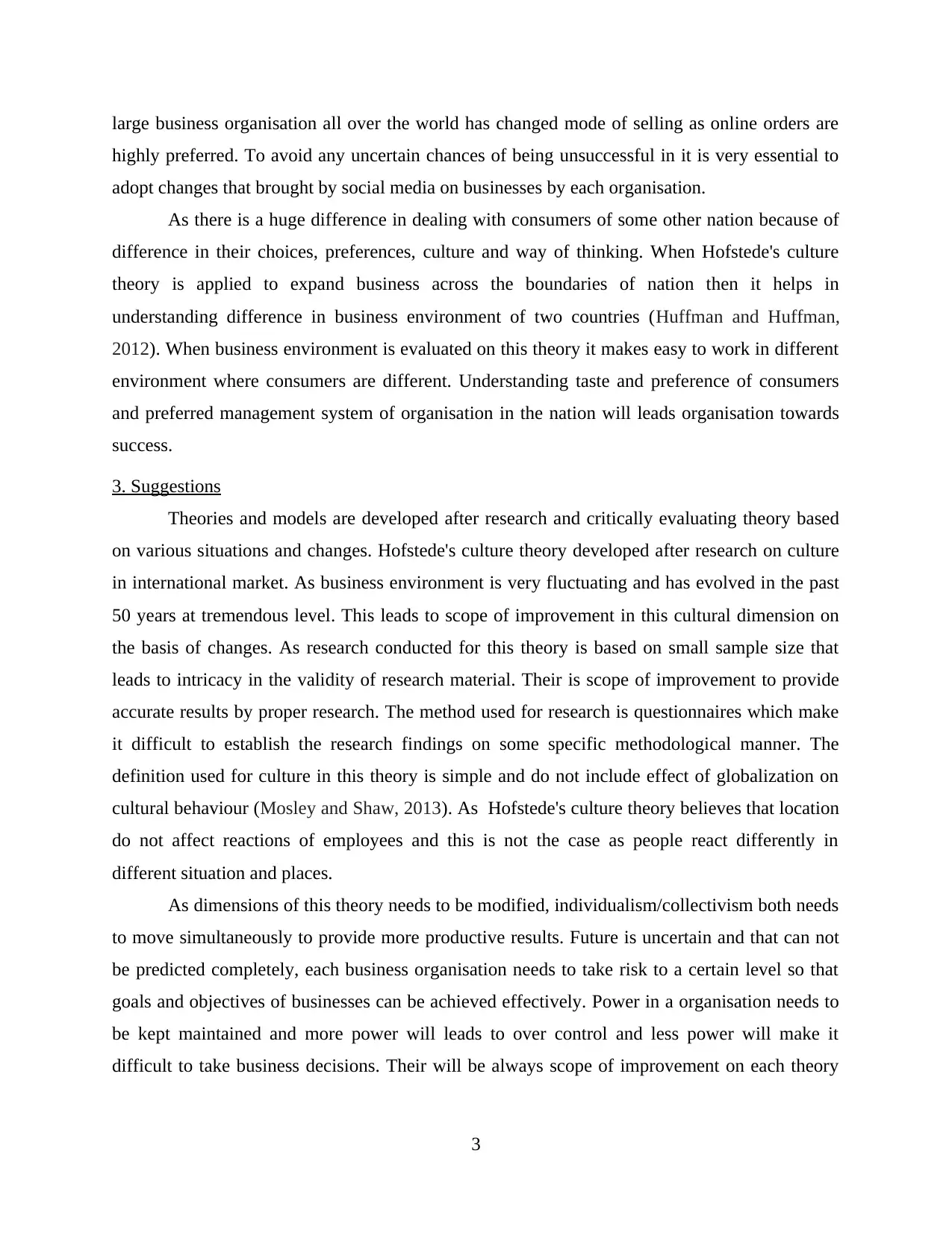
large business organisation all over the world has changed mode of selling as online orders are
highly preferred. To avoid any uncertain chances of being unsuccessful in it is very essential to
adopt changes that brought by social media on businesses by each organisation.
As there is a huge difference in dealing with consumers of some other nation because of
difference in their choices, preferences, culture and way of thinking. When Hofstede's culture
theory is applied to expand business across the boundaries of nation then it helps in
understanding difference in business environment of two countries (Huffman and Huffman,
2012). When business environment is evaluated on this theory it makes easy to work in different
environment where consumers are different. Understanding taste and preference of consumers
and preferred management system of organisation in the nation will leads organisation towards
success.
3. Suggestions
Theories and models are developed after research and critically evaluating theory based
on various situations and changes. Hofstede's culture theory developed after research on culture
in international market. As business environment is very fluctuating and has evolved in the past
50 years at tremendous level. This leads to scope of improvement in this cultural dimension on
the basis of changes. As research conducted for this theory is based on small sample size that
leads to intricacy in the validity of research material. Their is scope of improvement to provide
accurate results by proper research. The method used for research is questionnaires which make
it difficult to establish the research findings on some specific methodological manner. The
definition used for culture in this theory is simple and do not include effect of globalization on
cultural behaviour (Mosley and Shaw, 2013). As Hofstede's culture theory believes that location
do not affect reactions of employees and this is not the case as people react differently in
different situation and places.
As dimensions of this theory needs to be modified, individualism/collectivism both needs
to move simultaneously to provide more productive results. Future is uncertain and that can not
be predicted completely, each business organisation needs to take risk to a certain level so that
goals and objectives of businesses can be achieved effectively. Power in a organisation needs to
be kept maintained and more power will leads to over control and less power will make it
difficult to take business decisions. Their will be always scope of improvement on each theory
3
highly preferred. To avoid any uncertain chances of being unsuccessful in it is very essential to
adopt changes that brought by social media on businesses by each organisation.
As there is a huge difference in dealing with consumers of some other nation because of
difference in their choices, preferences, culture and way of thinking. When Hofstede's culture
theory is applied to expand business across the boundaries of nation then it helps in
understanding difference in business environment of two countries (Huffman and Huffman,
2012). When business environment is evaluated on this theory it makes easy to work in different
environment where consumers are different. Understanding taste and preference of consumers
and preferred management system of organisation in the nation will leads organisation towards
success.
3. Suggestions
Theories and models are developed after research and critically evaluating theory based
on various situations and changes. Hofstede's culture theory developed after research on culture
in international market. As business environment is very fluctuating and has evolved in the past
50 years at tremendous level. This leads to scope of improvement in this cultural dimension on
the basis of changes. As research conducted for this theory is based on small sample size that
leads to intricacy in the validity of research material. Their is scope of improvement to provide
accurate results by proper research. The method used for research is questionnaires which make
it difficult to establish the research findings on some specific methodological manner. The
definition used for culture in this theory is simple and do not include effect of globalization on
cultural behaviour (Mosley and Shaw, 2013). As Hofstede's culture theory believes that location
do not affect reactions of employees and this is not the case as people react differently in
different situation and places.
As dimensions of this theory needs to be modified, individualism/collectivism both needs
to move simultaneously to provide more productive results. Future is uncertain and that can not
be predicted completely, each business organisation needs to take risk to a certain level so that
goals and objectives of businesses can be achieved effectively. Power in a organisation needs to
be kept maintained and more power will leads to over control and less power will make it
difficult to take business decisions. Their will be always scope of improvement on each theory
3
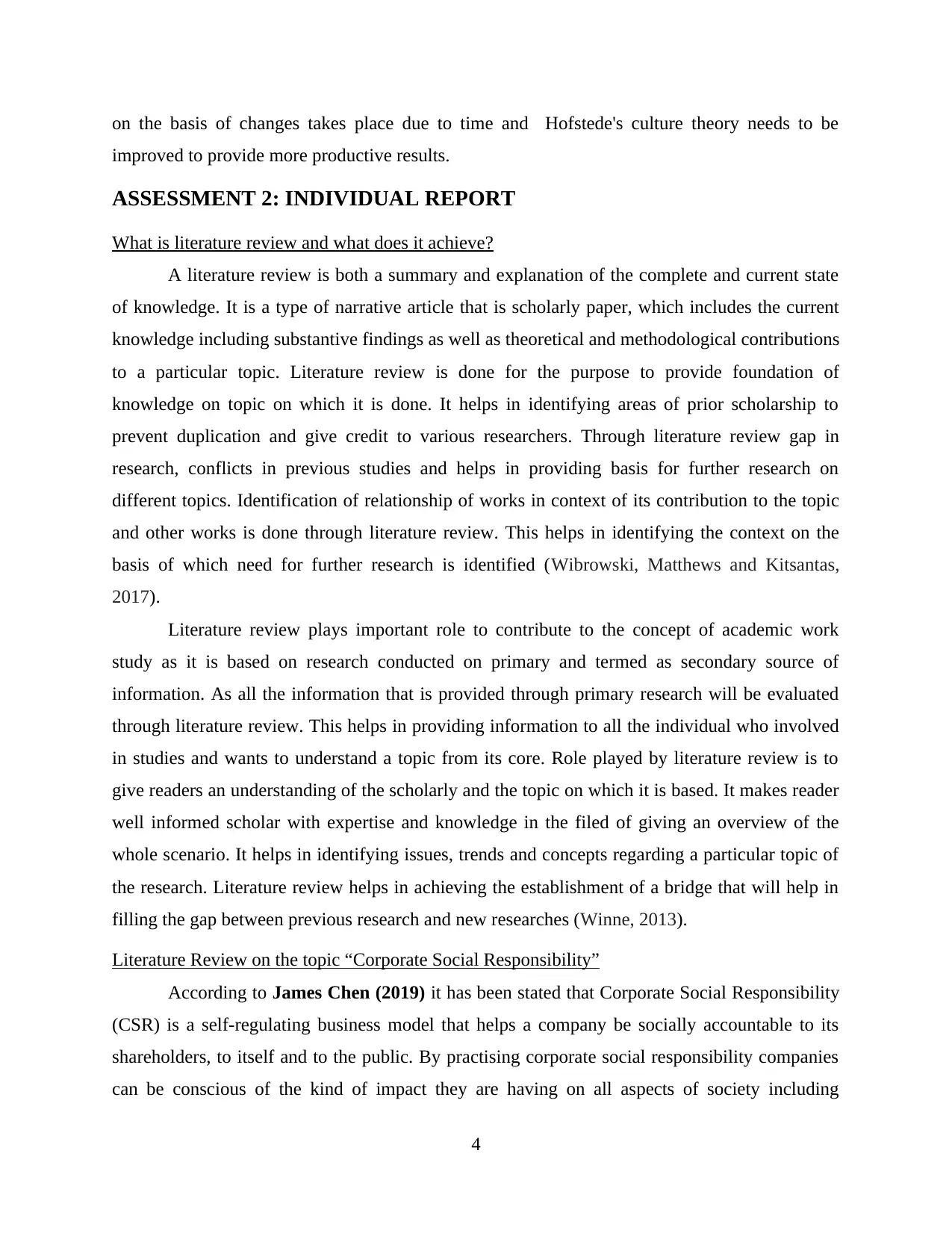
on the basis of changes takes place due to time and Hofstede's culture theory needs to be
improved to provide more productive results.
ASSESSMENT 2: INDIVIDUAL REPORT
What is literature review and what does it achieve?
A literature review is both a summary and explanation of the complete and current state
of knowledge. It is a type of narrative article that is scholarly paper, which includes the current
knowledge including substantive findings as well as theoretical and methodological contributions
to a particular topic. Literature review is done for the purpose to provide foundation of
knowledge on topic on which it is done. It helps in identifying areas of prior scholarship to
prevent duplication and give credit to various researchers. Through literature review gap in
research, conflicts in previous studies and helps in providing basis for further research on
different topics. Identification of relationship of works in context of its contribution to the topic
and other works is done through literature review. This helps in identifying the context on the
basis of which need for further research is identified (Wibrowski, Matthews and Kitsantas,
2017).
Literature review plays important role to contribute to the concept of academic work
study as it is based on research conducted on primary and termed as secondary source of
information. As all the information that is provided through primary research will be evaluated
through literature review. This helps in providing information to all the individual who involved
in studies and wants to understand a topic from its core. Role played by literature review is to
give readers an understanding of the scholarly and the topic on which it is based. It makes reader
well informed scholar with expertise and knowledge in the filed of giving an overview of the
whole scenario. It helps in identifying issues, trends and concepts regarding a particular topic of
the research. Literature review helps in achieving the establishment of a bridge that will help in
filling the gap between previous research and new researches (Winne, 2013).
Literature Review on the topic “Corporate Social Responsibility”
According to James Chen (2019) it has been stated that Corporate Social Responsibility
(CSR) is a self-regulating business model that helps a company be socially accountable to its
shareholders, to itself and to the public. By practising corporate social responsibility companies
can be conscious of the kind of impact they are having on all aspects of society including
4
improved to provide more productive results.
ASSESSMENT 2: INDIVIDUAL REPORT
What is literature review and what does it achieve?
A literature review is both a summary and explanation of the complete and current state
of knowledge. It is a type of narrative article that is scholarly paper, which includes the current
knowledge including substantive findings as well as theoretical and methodological contributions
to a particular topic. Literature review is done for the purpose to provide foundation of
knowledge on topic on which it is done. It helps in identifying areas of prior scholarship to
prevent duplication and give credit to various researchers. Through literature review gap in
research, conflicts in previous studies and helps in providing basis for further research on
different topics. Identification of relationship of works in context of its contribution to the topic
and other works is done through literature review. This helps in identifying the context on the
basis of which need for further research is identified (Wibrowski, Matthews and Kitsantas,
2017).
Literature review plays important role to contribute to the concept of academic work
study as it is based on research conducted on primary and termed as secondary source of
information. As all the information that is provided through primary research will be evaluated
through literature review. This helps in providing information to all the individual who involved
in studies and wants to understand a topic from its core. Role played by literature review is to
give readers an understanding of the scholarly and the topic on which it is based. It makes reader
well informed scholar with expertise and knowledge in the filed of giving an overview of the
whole scenario. It helps in identifying issues, trends and concepts regarding a particular topic of
the research. Literature review helps in achieving the establishment of a bridge that will help in
filling the gap between previous research and new researches (Winne, 2013).
Literature Review on the topic “Corporate Social Responsibility”
According to James Chen (2019) it has been stated that Corporate Social Responsibility
(CSR) is a self-regulating business model that helps a company be socially accountable to its
shareholders, to itself and to the public. By practising corporate social responsibility companies
can be conscious of the kind of impact they are having on all aspects of society including
4
⊘ This is a preview!⊘
Do you want full access?
Subscribe today to unlock all pages.

Trusted by 1+ million students worldwide
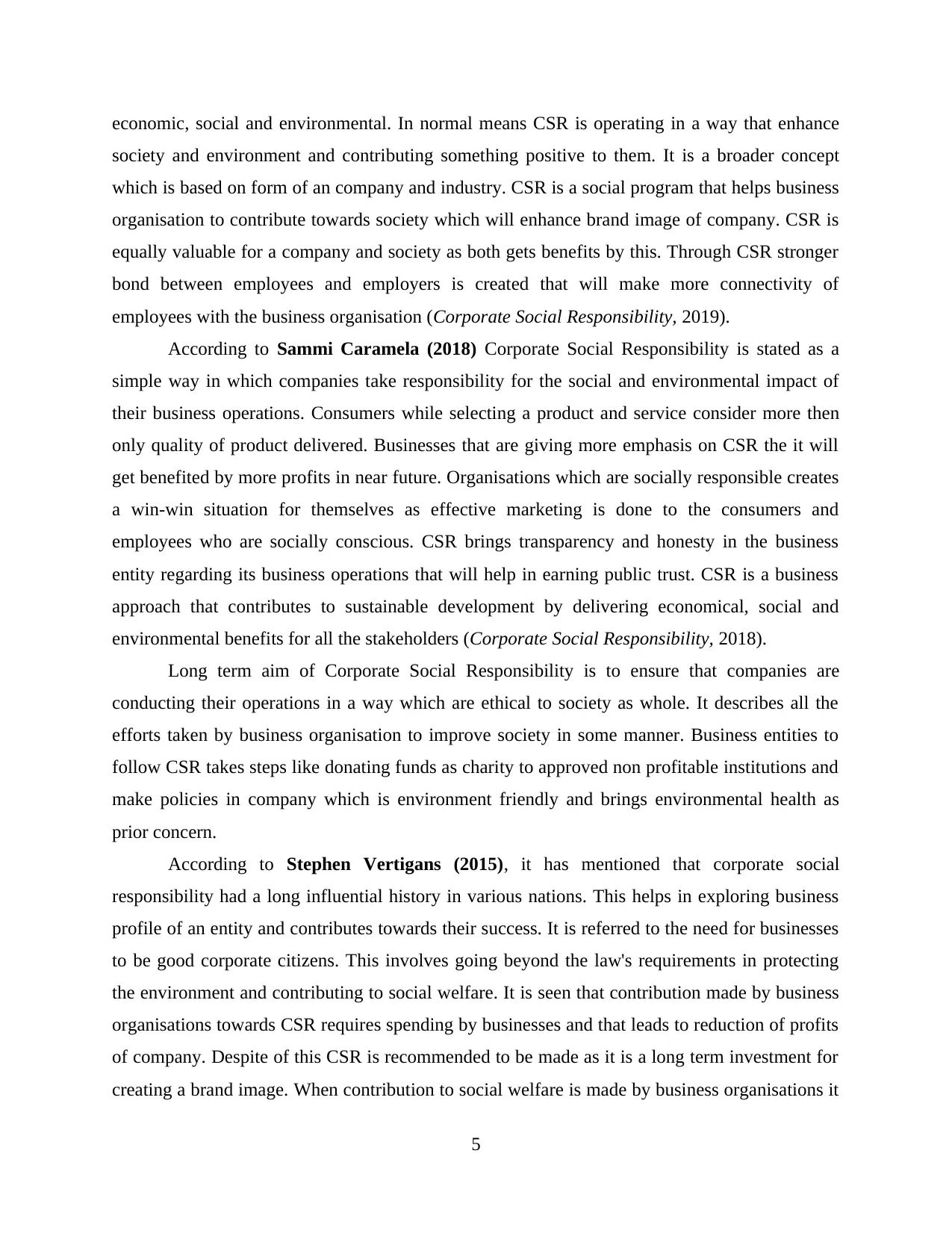
economic, social and environmental. In normal means CSR is operating in a way that enhance
society and environment and contributing something positive to them. It is a broader concept
which is based on form of an company and industry. CSR is a social program that helps business
organisation to contribute towards society which will enhance brand image of company. CSR is
equally valuable for a company and society as both gets benefits by this. Through CSR stronger
bond between employees and employers is created that will make more connectivity of
employees with the business organisation (Corporate Social Responsibility, 2019).
According to Sammi Caramela (2018) Corporate Social Responsibility is stated as a
simple way in which companies take responsibility for the social and environmental impact of
their business operations. Consumers while selecting a product and service consider more then
only quality of product delivered. Businesses that are giving more emphasis on CSR the it will
get benefited by more profits in near future. Organisations which are socially responsible creates
a win-win situation for themselves as effective marketing is done to the consumers and
employees who are socially conscious. CSR brings transparency and honesty in the business
entity regarding its business operations that will help in earning public trust. CSR is a business
approach that contributes to sustainable development by delivering economical, social and
environmental benefits for all the stakeholders (Corporate Social Responsibility, 2018).
Long term aim of Corporate Social Responsibility is to ensure that companies are
conducting their operations in a way which are ethical to society as whole. It describes all the
efforts taken by business organisation to improve society in some manner. Business entities to
follow CSR takes steps like donating funds as charity to approved non profitable institutions and
make policies in company which is environment friendly and brings environmental health as
prior concern.
According to Stephen Vertigans (2015), it has mentioned that corporate social
responsibility had a long influential history in various nations. This helps in exploring business
profile of an entity and contributes towards their success. It is referred to the need for businesses
to be good corporate citizens. This involves going beyond the law's requirements in protecting
the environment and contributing to social welfare. It is seen that contribution made by business
organisations towards CSR requires spending by businesses and that leads to reduction of profits
of company. Despite of this CSR is recommended to be made as it is a long term investment for
creating a brand image. When contribution to social welfare is made by business organisations it
5
society and environment and contributing something positive to them. It is a broader concept
which is based on form of an company and industry. CSR is a social program that helps business
organisation to contribute towards society which will enhance brand image of company. CSR is
equally valuable for a company and society as both gets benefits by this. Through CSR stronger
bond between employees and employers is created that will make more connectivity of
employees with the business organisation (Corporate Social Responsibility, 2019).
According to Sammi Caramela (2018) Corporate Social Responsibility is stated as a
simple way in which companies take responsibility for the social and environmental impact of
their business operations. Consumers while selecting a product and service consider more then
only quality of product delivered. Businesses that are giving more emphasis on CSR the it will
get benefited by more profits in near future. Organisations which are socially responsible creates
a win-win situation for themselves as effective marketing is done to the consumers and
employees who are socially conscious. CSR brings transparency and honesty in the business
entity regarding its business operations that will help in earning public trust. CSR is a business
approach that contributes to sustainable development by delivering economical, social and
environmental benefits for all the stakeholders (Corporate Social Responsibility, 2018).
Long term aim of Corporate Social Responsibility is to ensure that companies are
conducting their operations in a way which are ethical to society as whole. It describes all the
efforts taken by business organisation to improve society in some manner. Business entities to
follow CSR takes steps like donating funds as charity to approved non profitable institutions and
make policies in company which is environment friendly and brings environmental health as
prior concern.
According to Stephen Vertigans (2015), it has mentioned that corporate social
responsibility had a long influential history in various nations. This helps in exploring business
profile of an entity and contributes towards their success. It is referred to the need for businesses
to be good corporate citizens. This involves going beyond the law's requirements in protecting
the environment and contributing to social welfare. It is seen that contribution made by business
organisations towards CSR requires spending by businesses and that leads to reduction of profits
of company. Despite of this CSR is recommended to be made as it is a long term investment for
creating a brand image. When contribution to social welfare is made by business organisations it
5
Paraphrase This Document
Need a fresh take? Get an instant paraphrase of this document with our AI Paraphraser
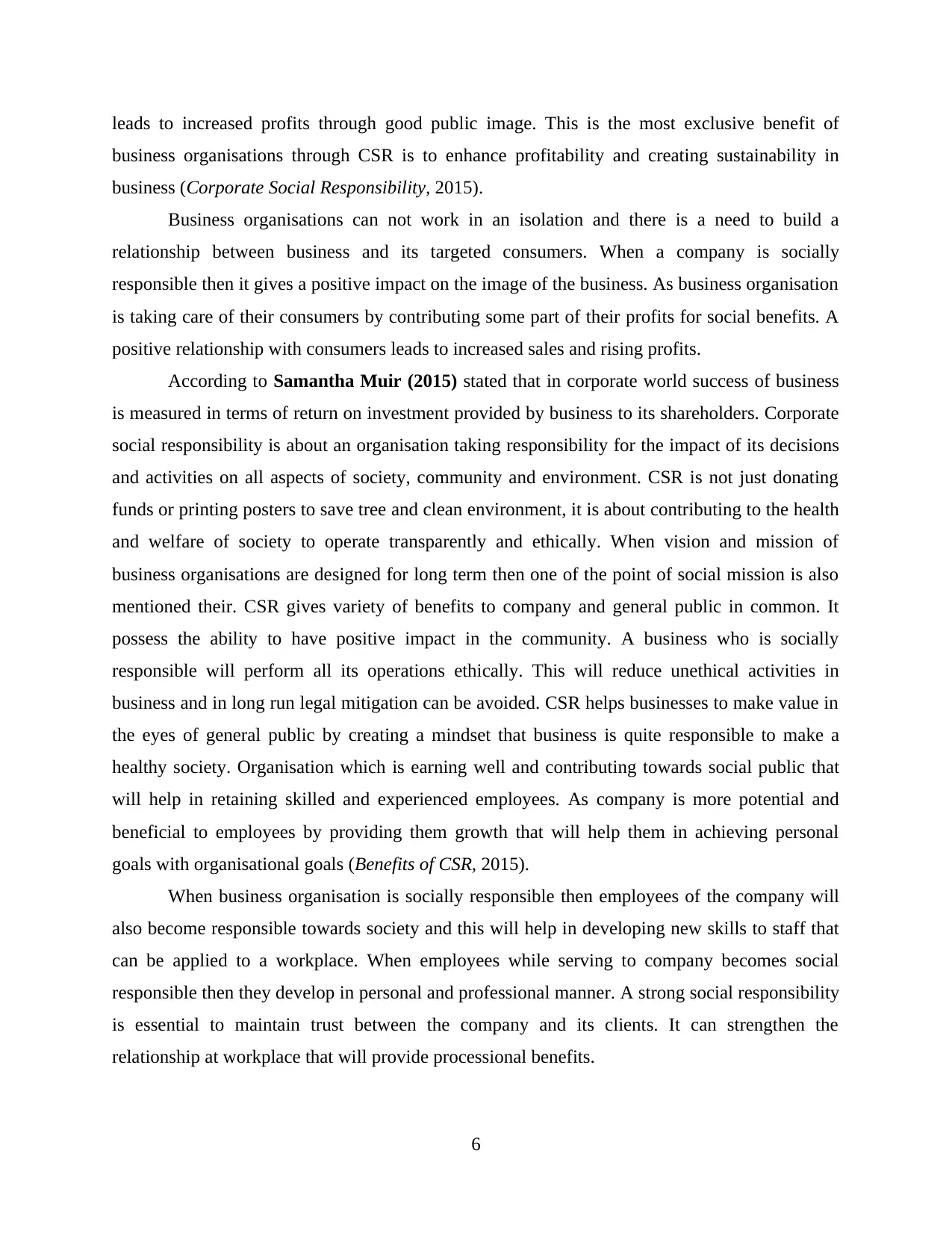
leads to increased profits through good public image. This is the most exclusive benefit of
business organisations through CSR is to enhance profitability and creating sustainability in
business (Corporate Social Responsibility, 2015).
Business organisations can not work in an isolation and there is a need to build a
relationship between business and its targeted consumers. When a company is socially
responsible then it gives a positive impact on the image of the business. As business organisation
is taking care of their consumers by contributing some part of their profits for social benefits. A
positive relationship with consumers leads to increased sales and rising profits.
According to Samantha Muir (2015) stated that in corporate world success of business
is measured in terms of return on investment provided by business to its shareholders. Corporate
social responsibility is about an organisation taking responsibility for the impact of its decisions
and activities on all aspects of society, community and environment. CSR is not just donating
funds or printing posters to save tree and clean environment, it is about contributing to the health
and welfare of society to operate transparently and ethically. When vision and mission of
business organisations are designed for long term then one of the point of social mission is also
mentioned their. CSR gives variety of benefits to company and general public in common. It
possess the ability to have positive impact in the community. A business who is socially
responsible will perform all its operations ethically. This will reduce unethical activities in
business and in long run legal mitigation can be avoided. CSR helps businesses to make value in
the eyes of general public by creating a mindset that business is quite responsible to make a
healthy society. Organisation which is earning well and contributing towards social public that
will help in retaining skilled and experienced employees. As company is more potential and
beneficial to employees by providing them growth that will help them in achieving personal
goals with organisational goals (Benefits of CSR, 2015).
When business organisation is socially responsible then employees of the company will
also become responsible towards society and this will help in developing new skills to staff that
can be applied to a workplace. When employees while serving to company becomes social
responsible then they develop in personal and professional manner. A strong social responsibility
is essential to maintain trust between the company and its clients. It can strengthen the
relationship at workplace that will provide processional benefits.
6
business organisations through CSR is to enhance profitability and creating sustainability in
business (Corporate Social Responsibility, 2015).
Business organisations can not work in an isolation and there is a need to build a
relationship between business and its targeted consumers. When a company is socially
responsible then it gives a positive impact on the image of the business. As business organisation
is taking care of their consumers by contributing some part of their profits for social benefits. A
positive relationship with consumers leads to increased sales and rising profits.
According to Samantha Muir (2015) stated that in corporate world success of business
is measured in terms of return on investment provided by business to its shareholders. Corporate
social responsibility is about an organisation taking responsibility for the impact of its decisions
and activities on all aspects of society, community and environment. CSR is not just donating
funds or printing posters to save tree and clean environment, it is about contributing to the health
and welfare of society to operate transparently and ethically. When vision and mission of
business organisations are designed for long term then one of the point of social mission is also
mentioned their. CSR gives variety of benefits to company and general public in common. It
possess the ability to have positive impact in the community. A business who is socially
responsible will perform all its operations ethically. This will reduce unethical activities in
business and in long run legal mitigation can be avoided. CSR helps businesses to make value in
the eyes of general public by creating a mindset that business is quite responsible to make a
healthy society. Organisation which is earning well and contributing towards social public that
will help in retaining skilled and experienced employees. As company is more potential and
beneficial to employees by providing them growth that will help them in achieving personal
goals with organisational goals (Benefits of CSR, 2015).
When business organisation is socially responsible then employees of the company will
also become responsible towards society and this will help in developing new skills to staff that
can be applied to a workplace. When employees while serving to company becomes social
responsible then they develop in personal and professional manner. A strong social responsibility
is essential to maintain trust between the company and its clients. It can strengthen the
relationship at workplace that will provide processional benefits.
6
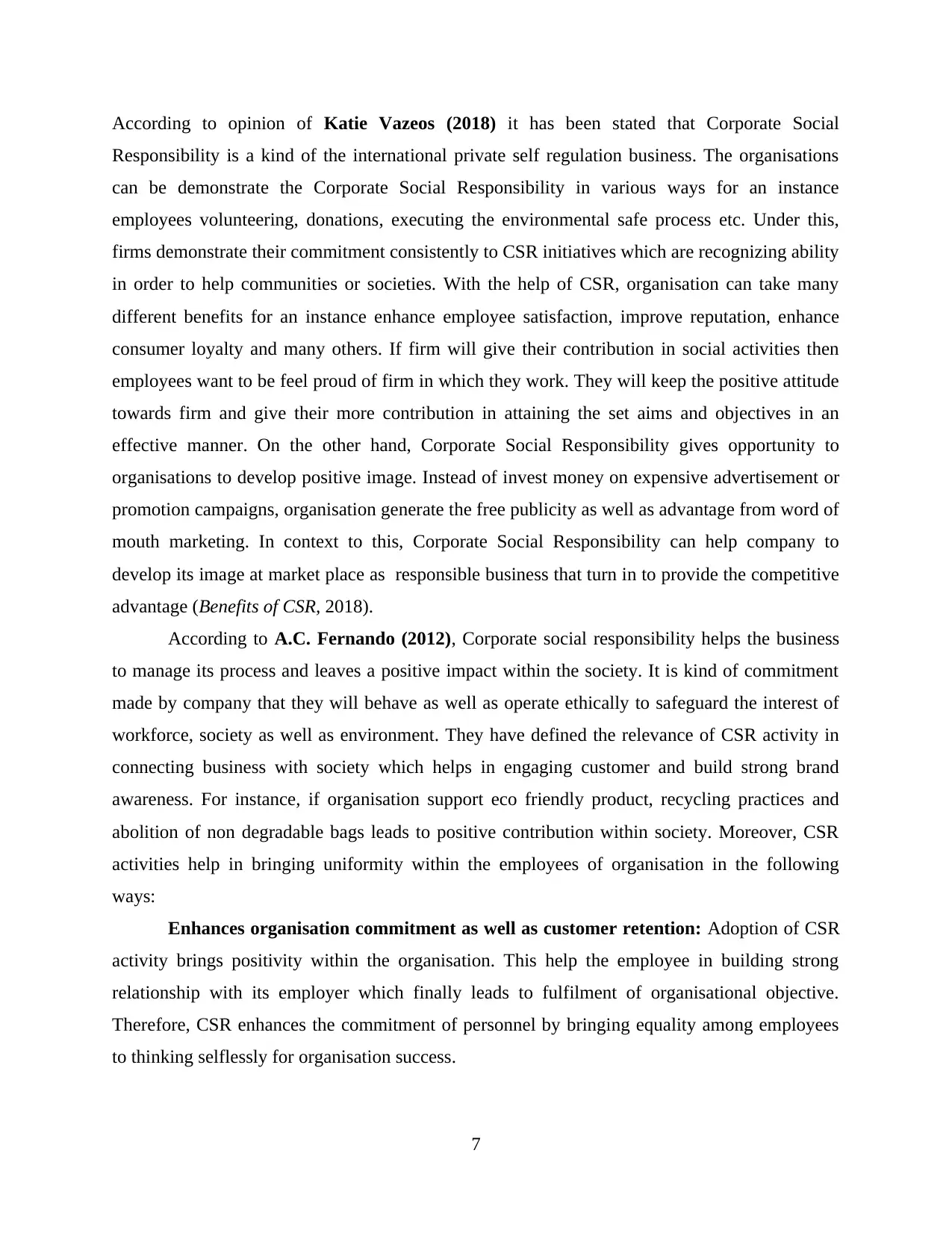
According to opinion of Katie Vazeos (2018) it has been stated that Corporate Social
Responsibility is a kind of the international private self regulation business. The organisations
can be demonstrate the Corporate Social Responsibility in various ways for an instance
employees volunteering, donations, executing the environmental safe process etc. Under this,
firms demonstrate their commitment consistently to CSR initiatives which are recognizing ability
in order to help communities or societies. With the help of CSR, organisation can take many
different benefits for an instance enhance employee satisfaction, improve reputation, enhance
consumer loyalty and many others. If firm will give their contribution in social activities then
employees want to be feel proud of firm in which they work. They will keep the positive attitude
towards firm and give their more contribution in attaining the set aims and objectives in an
effective manner. On the other hand, Corporate Social Responsibility gives opportunity to
organisations to develop positive image. Instead of invest money on expensive advertisement or
promotion campaigns, organisation generate the free publicity as well as advantage from word of
mouth marketing. In context to this, Corporate Social Responsibility can help company to
develop its image at market place as responsible business that turn in to provide the competitive
advantage (Benefits of CSR, 2018).
According to A.C. Fernando (2012), Corporate social responsibility helps the business
to manage its process and leaves a positive impact within the society. It is kind of commitment
made by company that they will behave as well as operate ethically to safeguard the interest of
workforce, society as well as environment. They have defined the relevance of CSR activity in
connecting business with society which helps in engaging customer and build strong brand
awareness. For instance, if organisation support eco friendly product, recycling practices and
abolition of non degradable bags leads to positive contribution within society. Moreover, CSR
activities help in bringing uniformity within the employees of organisation in the following
ways:
Enhances organisation commitment as well as customer retention: Adoption of CSR
activity brings positivity within the organisation. This help the employee in building strong
relationship with its employer which finally leads to fulfilment of organisational objective.
Therefore, CSR enhances the commitment of personnel by bringing equality among employees
to thinking selflessly for organisation success.
7
Responsibility is a kind of the international private self regulation business. The organisations
can be demonstrate the Corporate Social Responsibility in various ways for an instance
employees volunteering, donations, executing the environmental safe process etc. Under this,
firms demonstrate their commitment consistently to CSR initiatives which are recognizing ability
in order to help communities or societies. With the help of CSR, organisation can take many
different benefits for an instance enhance employee satisfaction, improve reputation, enhance
consumer loyalty and many others. If firm will give their contribution in social activities then
employees want to be feel proud of firm in which they work. They will keep the positive attitude
towards firm and give their more contribution in attaining the set aims and objectives in an
effective manner. On the other hand, Corporate Social Responsibility gives opportunity to
organisations to develop positive image. Instead of invest money on expensive advertisement or
promotion campaigns, organisation generate the free publicity as well as advantage from word of
mouth marketing. In context to this, Corporate Social Responsibility can help company to
develop its image at market place as responsible business that turn in to provide the competitive
advantage (Benefits of CSR, 2018).
According to A.C. Fernando (2012), Corporate social responsibility helps the business
to manage its process and leaves a positive impact within the society. It is kind of commitment
made by company that they will behave as well as operate ethically to safeguard the interest of
workforce, society as well as environment. They have defined the relevance of CSR activity in
connecting business with society which helps in engaging customer and build strong brand
awareness. For instance, if organisation support eco friendly product, recycling practices and
abolition of non degradable bags leads to positive contribution within society. Moreover, CSR
activities help in bringing uniformity within the employees of organisation in the following
ways:
Enhances organisation commitment as well as customer retention: Adoption of CSR
activity brings positivity within the organisation. This help the employee in building strong
relationship with its employer which finally leads to fulfilment of organisational objective.
Therefore, CSR enhances the commitment of personnel by bringing equality among employees
to thinking selflessly for organisation success.
7
⊘ This is a preview!⊘
Do you want full access?
Subscribe today to unlock all pages.

Trusted by 1+ million students worldwide
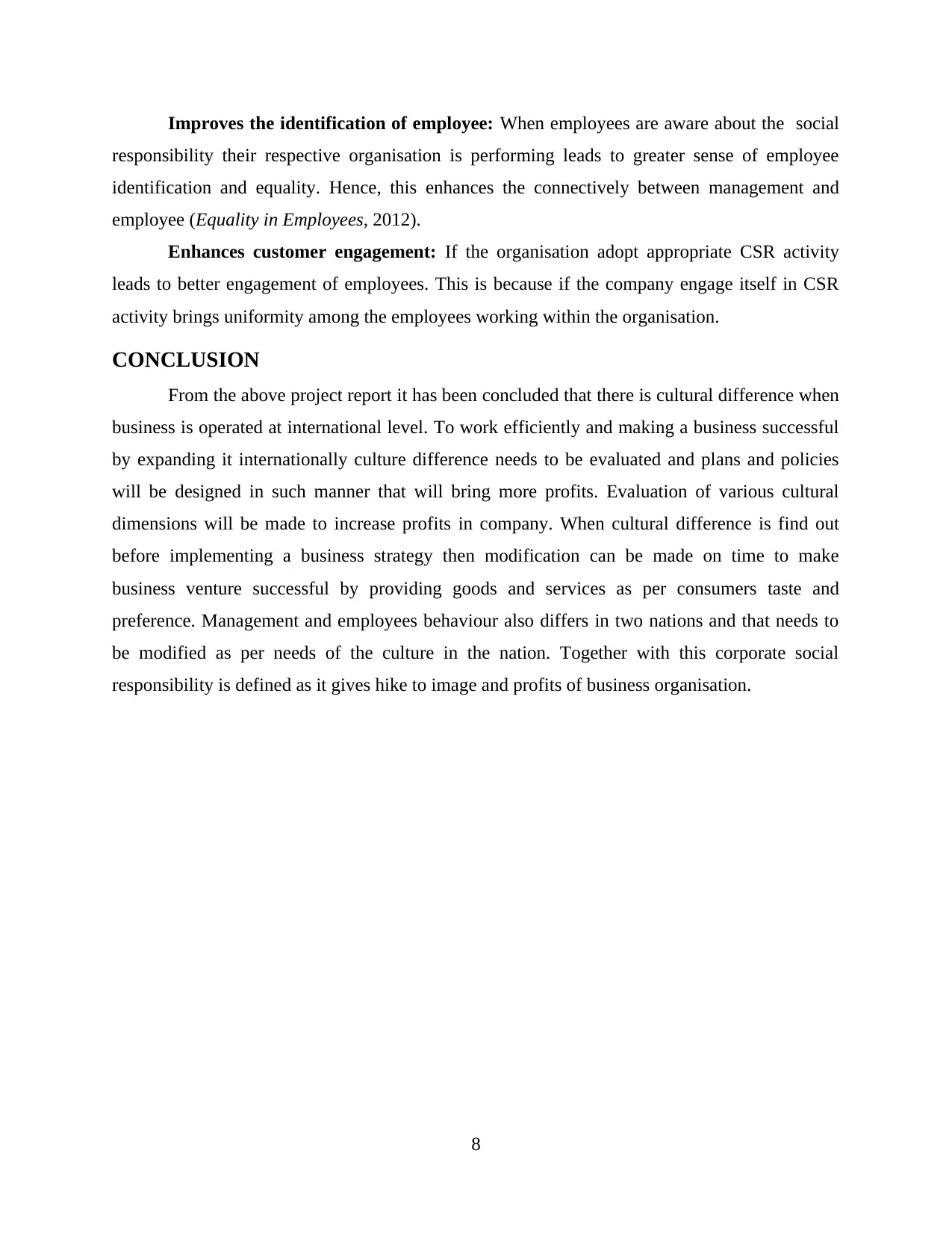
Improves the identification of employee: When employees are aware about the social
responsibility their respective organisation is performing leads to greater sense of employee
identification and equality. Hence, this enhances the connectively between management and
employee (Equality in Employees, 2012).
Enhances customer engagement: If the organisation adopt appropriate CSR activity
leads to better engagement of employees. This is because if the company engage itself in CSR
activity brings uniformity among the employees working within the organisation.
CONCLUSION
From the above project report it has been concluded that there is cultural difference when
business is operated at international level. To work efficiently and making a business successful
by expanding it internationally culture difference needs to be evaluated and plans and policies
will be designed in such manner that will bring more profits. Evaluation of various cultural
dimensions will be made to increase profits in company. When cultural difference is find out
before implementing a business strategy then modification can be made on time to make
business venture successful by providing goods and services as per consumers taste and
preference. Management and employees behaviour also differs in two nations and that needs to
be modified as per needs of the culture in the nation. Together with this corporate social
responsibility is defined as it gives hike to image and profits of business organisation.
8
responsibility their respective organisation is performing leads to greater sense of employee
identification and equality. Hence, this enhances the connectively between management and
employee (Equality in Employees, 2012).
Enhances customer engagement: If the organisation adopt appropriate CSR activity
leads to better engagement of employees. This is because if the company engage itself in CSR
activity brings uniformity among the employees working within the organisation.
CONCLUSION
From the above project report it has been concluded that there is cultural difference when
business is operated at international level. To work efficiently and making a business successful
by expanding it internationally culture difference needs to be evaluated and plans and policies
will be designed in such manner that will bring more profits. Evaluation of various cultural
dimensions will be made to increase profits in company. When cultural difference is find out
before implementing a business strategy then modification can be made on time to make
business venture successful by providing goods and services as per consumers taste and
preference. Management and employees behaviour also differs in two nations and that needs to
be modified as per needs of the culture in the nation. Together with this corporate social
responsibility is defined as it gives hike to image and profits of business organisation.
8
Paraphrase This Document
Need a fresh take? Get an instant paraphrase of this document with our AI Paraphraser
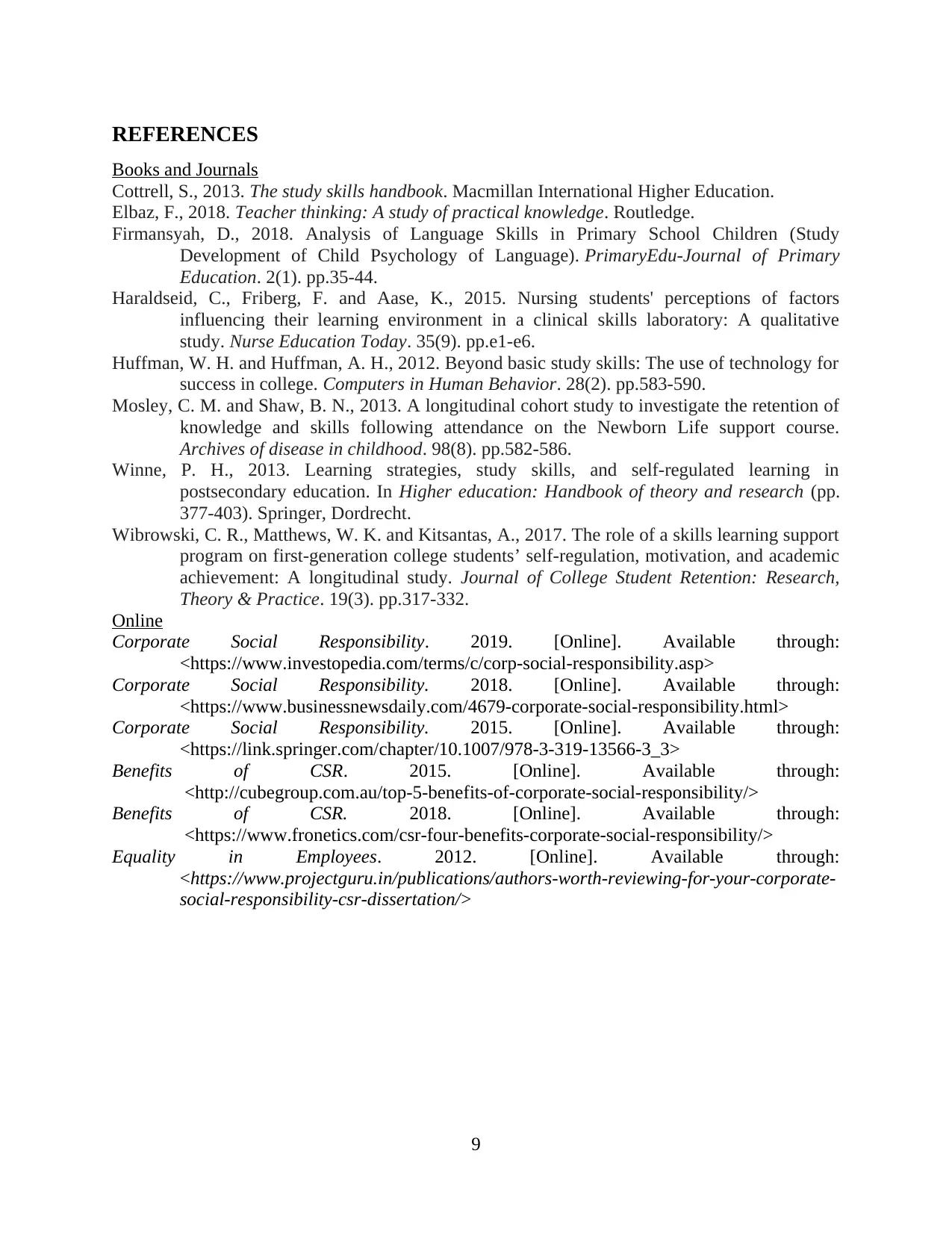
REFERENCES
Books and Journals
Cottrell, S., 2013. The study skills handbook. Macmillan International Higher Education.
Elbaz, F., 2018. Teacher thinking: A study of practical knowledge. Routledge.
Firmansyah, D., 2018. Analysis of Language Skills in Primary School Children (Study
Development of Child Psychology of Language). PrimaryEdu-Journal of Primary
Education. 2(1). pp.35-44.
Haraldseid, C., Friberg, F. and Aase, K., 2015. Nursing students' perceptions of factors
influencing their learning environment in a clinical skills laboratory: A qualitative
study. Nurse Education Today. 35(9). pp.e1-e6.
Huffman, W. H. and Huffman, A. H., 2012. Beyond basic study skills: The use of technology for
success in college. Computers in Human Behavior. 28(2). pp.583-590.
Mosley, C. M. and Shaw, B. N., 2013. A longitudinal cohort study to investigate the retention of
knowledge and skills following attendance on the Newborn Life support course.
Archives of disease in childhood. 98(8). pp.582-586.
Winne, P. H., 2013. Learning strategies, study skills, and self-regulated learning in
postsecondary education. In Higher education: Handbook of theory and research (pp.
377-403). Springer, Dordrecht.
Wibrowski, C. R., Matthews, W. K. and Kitsantas, A., 2017. The role of a skills learning support
program on first-generation college students’ self-regulation, motivation, and academic
achievement: A longitudinal study. Journal of College Student Retention: Research,
Theory & Practice. 19(3). pp.317-332.
Online
Corporate Social Responsibility. 2019. [Online]. Available through:
<https://www.investopedia.com/terms/c/corp-social-responsibility.asp>
Corporate Social Responsibility. 2018. [Online]. Available through:
<https://www.businessnewsdaily.com/4679-corporate-social-responsibility.html>
Corporate Social Responsibility. 2015. [Online]. Available through:
<https://link.springer.com/chapter/10.1007/978-3-319-13566-3_3>
Benefits of CSR. 2015. [Online]. Available through:
<http://cubegroup.com.au/top-5-benefits-of-corporate-social-responsibility/>
Benefits of CSR. 2018. [Online]. Available through:
<https://www.fronetics.com/csr-four-benefits-corporate-social-responsibility/>
Equality in Employees. 2012. [Online]. Available through:
<https://www.projectguru.in/publications/authors-worth-reviewing-for-your-corporate-
social-responsibility-csr-dissertation/>
9
Books and Journals
Cottrell, S., 2013. The study skills handbook. Macmillan International Higher Education.
Elbaz, F., 2018. Teacher thinking: A study of practical knowledge. Routledge.
Firmansyah, D., 2018. Analysis of Language Skills in Primary School Children (Study
Development of Child Psychology of Language). PrimaryEdu-Journal of Primary
Education. 2(1). pp.35-44.
Haraldseid, C., Friberg, F. and Aase, K., 2015. Nursing students' perceptions of factors
influencing their learning environment in a clinical skills laboratory: A qualitative
study. Nurse Education Today. 35(9). pp.e1-e6.
Huffman, W. H. and Huffman, A. H., 2012. Beyond basic study skills: The use of technology for
success in college. Computers in Human Behavior. 28(2). pp.583-590.
Mosley, C. M. and Shaw, B. N., 2013. A longitudinal cohort study to investigate the retention of
knowledge and skills following attendance on the Newborn Life support course.
Archives of disease in childhood. 98(8). pp.582-586.
Winne, P. H., 2013. Learning strategies, study skills, and self-regulated learning in
postsecondary education. In Higher education: Handbook of theory and research (pp.
377-403). Springer, Dordrecht.
Wibrowski, C. R., Matthews, W. K. and Kitsantas, A., 2017. The role of a skills learning support
program on first-generation college students’ self-regulation, motivation, and academic
achievement: A longitudinal study. Journal of College Student Retention: Research,
Theory & Practice. 19(3). pp.317-332.
Online
Corporate Social Responsibility. 2019. [Online]. Available through:
<https://www.investopedia.com/terms/c/corp-social-responsibility.asp>
Corporate Social Responsibility. 2018. [Online]. Available through:
<https://www.businessnewsdaily.com/4679-corporate-social-responsibility.html>
Corporate Social Responsibility. 2015. [Online]. Available through:
<https://link.springer.com/chapter/10.1007/978-3-319-13566-3_3>
Benefits of CSR. 2015. [Online]. Available through:
<http://cubegroup.com.au/top-5-benefits-of-corporate-social-responsibility/>
Benefits of CSR. 2018. [Online]. Available through:
<https://www.fronetics.com/csr-four-benefits-corporate-social-responsibility/>
Equality in Employees. 2012. [Online]. Available through:
<https://www.projectguru.in/publications/authors-worth-reviewing-for-your-corporate-
social-responsibility-csr-dissertation/>
9
1 out of 11
Related Documents
Your All-in-One AI-Powered Toolkit for Academic Success.
+13062052269
info@desklib.com
Available 24*7 on WhatsApp / Email
![[object Object]](/_next/static/media/star-bottom.7253800d.svg)
Unlock your academic potential
Copyright © 2020–2026 A2Z Services. All Rights Reserved. Developed and managed by ZUCOL.




